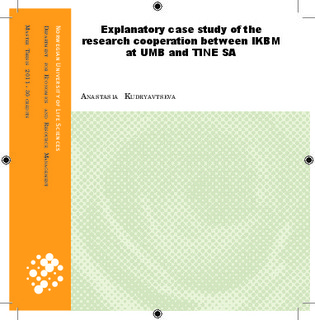| dc.description.abstract | “Coming together is a beginning. Keeping together is progress. Working together is success.”
Henry Ford. Background
The topic of university industry- relationships has been an issue for the studying for the last two decades. It has been conducted practical studies and written a great number of scientific papers which are aimed at analyzing different aspects of U-I relationships. The topic of University-Industry Cooperation (UIC) is an interesting topic for the research for a number of reasons. The two actors have basically significantly different “purposes of existence”. While the industry is more aiming at obtaining the commercial results, the universities are more interested in basic research, production and dissemination of knowledge. Industry is being forced to work under strict time limits and is often not interested to announce research results to the public. University researchers are driven by the individual interest in producing new knowledge. The challenge for both actors is to find a junction point where both actors could collaborate with positive outcomes for both parts. General difference in perceptions and incentives for the cooperation often arise problems in gaing a positive outcome from the collaboration. The point of this case study would be obtaining a deeper understanding on how both actors manage to communicate with one another without interest conflicts and what are the reasons of the success of the research collaboration.
The purpose of the study
In this paper it will be taken a closer look at the special case of research cooperation between University of Life Sciences in Ås (Department for chemistry, biotechnology and food science) and the Norwegian dairy company Tine SA, which remains one of the biggest actors on the market in Norway. The paper is an explanative study which will describe the cooperation between academia and industry and find out the reasons for the success of this cooperation. The reason for why especially these two actors were chosen for the study is bacause the cooperation between these two actors has a long and successful history which is quite a unique case. The process of research collaboration between the Department of chemistry, biotechnology and food science ( in the following called IKBM) and TINE SA is a successful case of “win-win” cooperation where both partners gain significant advantages from working together. First of all, I would like to describe the structure of the cooperation: practical organization, main knowledge transfer channels and psychological factors. Secondly, I would like to look closer at the exact courses of the success. I have therefore chosen to work on the following problem:
Qualitative analysis of the successful research cooperation between IKBM at UMB and TINE SA: general description and reasons for success.
Materials and method
In this paper I have used both primary and secondary data materials. Data collections were primarily conducted thorough personal meetings and interviews with both representatives from IKBM and TINE SA. It has been taken 4 semi-structured interviews with one representative form IKBM and the three representatives from TINE SA. The interviews were conducted in norwegian as it was easier for the respondents. The interviews were afterwards translated by me into English. Additionally, I have used scientific papers as secondary information.
Results and conclusion
The paper gives the description of TINE SA –IKBM relationships and the reasons for the success of this cooperation. The explanative study of research cooperation between IKBM and TINE SA has shown interesting results. The study revealed the main reasons for success and these turned out to be the following: historical reasons, good project management, strong personal relationships, strong research base at both actors, clear understating of each others’ environment and needs, trust and no hidden agendas, flow of graduates and clear policy on publication and IPRs. | no_NO |
